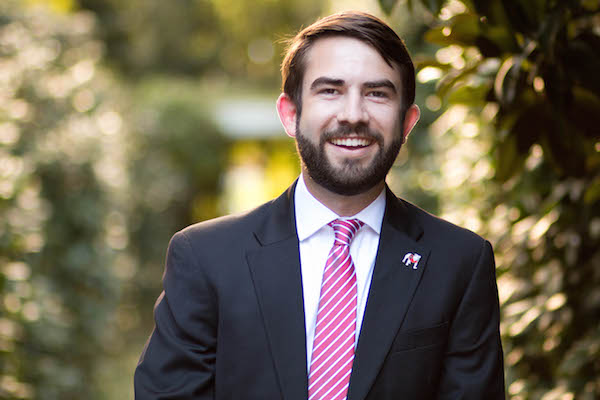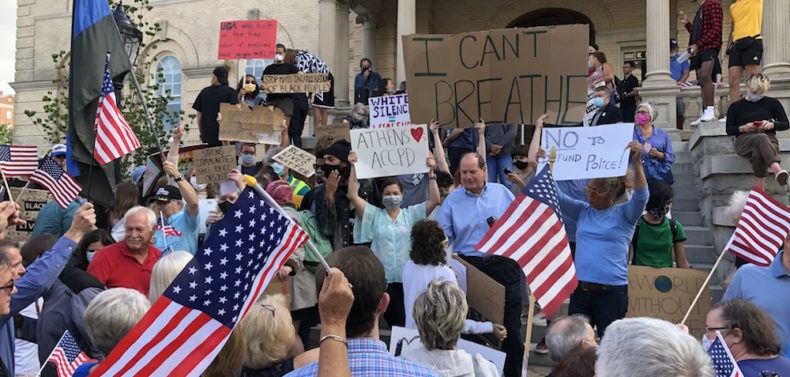“Defund the police” entered the national vocabulary last year after protests over officer violence rocked the nation.
The killings of Ahmaud Arbery, Rayshard Brooks, George Floyd and Breonna Taylor by white authority figures spurred mass protests that at times deteriorated into vandalism and violence. Buildings near the state Capitol were tagged with anti-police graffiti, and buildings around the nearby CNN Center were the targets of window-smashing and looting.
Republican members of the Georgia legislature have sponsored several bills they say will enhance protection for law enforcement officers and curtail protests, but opponents say the proposals threaten the authority of local governments and free speech rights.
Athens Republican state Rep. Houston Gaines’ House Bill 286 aims to prevent cities and counties from cutting police department spending. It would bar local governments from reducing police budgets by more than 5% from the prior year, with exceptions for years following large purchases by the department or when the local budget drops by more than 5%.
“As we’ve seen in our state, in my hometown in Athens, and we’ve also seen efforts in the city of Atlanta to defund the police, and we feel like that is something that will make our state less safe, and so we feel like it’s important that we address this issue,” Gaines said at a meeting of the House Governmental Affairs Committee last week, where the legislation passed largely on party lines.

Members of those city governments are not happy with Gaines’ idea.
In Athens-Clarke County, two commissioners—Mariah Parker and Tim Denson—supported a proposal to reduce the police department by 50% over 10 years and spend that money on issues like mental health instead, said Mayor Kelly Girtz.
“That proposal never advanced beyond two commissioners on an 11-member body, including me as a tiebreaker,” he said. “And so I don’t think one local legislative proposal that didn’t go anywhere needs to be the basis for statewide legislation that constrains so many different places.”
The budget that the commissioners passed included more than $1 million for police staff raises, Girtz added.
Atlanta City Councilman Antonio Brown said he disagreed with Gaines’ statement that Atlanta city government tried to defund its police department.
Brown and other members of the council proposed redirecting about a third of the city’s police budget to social services last summer after Brooks’ shooting death elevated tensions across the city, but that measure did not pass.
“No one on council has ever supported defunding the police. We supported reimagining public safety,” Brown said. “And this is where the problem comes in with this legislation. You take away the autonomy of local government, who’s in the trenches of our communities every day, being able to determine what works best for our residents based on what our residents are telling us.”
Gaines’ legislation is opposed by the Georgia Municipal Association and the Association County Commissioners of Georgia, groups that represent city and county governments.
“If city officials propose a police department budget reduction that does not reflect the goals of their residents, they are the first to hear about it,” said Georgia Municipal Association Governmental Relations Director Tom Gehl. “For that reason, GMA believes these types of decisions are best kept at the local level.”
Local control is important, but keeping Georgians safe is more important, Gaines said.
“I need to be able to go to sleep at night. I think a way to do that, for me to be able to do my job, is to keep our community safe,” he said. “I’m somebody who supports local control, but if we have an opportunity to make our community and state safer, then that’s what I’m going to support.”
Cataula Republican Sen. Randy Robertson, a retired deputy, has filed his own bill aimed at police and protesters. Senate Bill 171 also has a provision aimed at preventing local governments from defunding police, but Robertson’s method for doing that is to withhold state and federal funding from any city or county that reduces its police budget by 30% or more.
The bill also increases penalties for blocking a highway—a common protest tactic in 2020—or assault or damaging property when in a group.
The bill also would require local governments to set up a process to grant permits for all assemblies, which would need to be reviewed by an attorney and the heads of all local law enforcement agencies.
Cities or counties that hinder law enforcement during a riot or “unlawful assembly” could be held liable for damages, including wrongful deaths and damages arising from the assembly.
The bill, dubbed the Safe Communities Act of 2021, has been assigned to the Senate Judiciary Committee but has yet to come to a vote. It has the support of state law enforcement including the Police Benevolent Association of Georgia.
“The PBA of Georgia supports the general concept of this bill to hold people accountable for their unlawful activities that cause harm to others,” said Joe Stiles, Georgia executive director for the Southern States Police Benevolent Association. “It is sad that some individuals, groups of individuals, and organizations see rioting, looting, destruction of property, and violence are acceptable consequences of protesting, and perhaps this legislative action to increase the criminal and civil liabilities for these unlawful activities will help with returning to peaceful, lawful protests.”
Some Democrats who oppose the bill say it restricts the constitutional right of people to freely assemble.
Robinson’s bill will punish all protesters, most of whom are peaceful, for the actions of a few, said state Rep. Sandra Scott (D-Rex), who has filed a raft of police reform bills, some calling for more de-escalation training and body cameras.
“You just want to send them to jail and let them sit in jail because they were out protesting,” Scott said. “I do not agree with vandalism, I don’t think anyone should vandalize, but I don’t agree with sending a person to jail for years because they were protesting. Some people may have done something that was wrong, and they should pay for it. Make them pay for the damages that they make. Jail is not the solution to everything.”
Another Robertson police bill passed the Senate Public Safety Committee unanimously last week. Senate Bill 115 would require driver’s education instructors to teach students about how to interact with police officers during traffic stops.
“I don’t think I have to go into detail with this committee especially on all of the problems that have occurred throughout our country and throughout our state involving law enforcement officers and citizens operating motor vehicles,” Robertson said.
The lessons would include basic tips like being polite and keeping your hands where the officer can see them as well as information about motorists’ rights, like calling 911 to confirm the flashing blue lights belong to a law enforcement officer and how to report a grievance with a traffic stop.
Robertson said the measure would have little to no fiscal impact on the state as the curriculum already exists, but private instructors who teach Georgia’s new drivers may face additional costs to implement the new lessons.
Simple traffic stops shouldn’t escalate into volatile confrontations, said Terry Norton, executive director of the Georgia Sheriffs’ Association. Teaching young drivers what to do if they get pulled over will help avoid potential problems, he said.
“I think it will help reassure the public that, these are the basic mannerisms you should avoid, these are the basic mannerisms you should engage in, and I absolutely think it will help,” he said.
Scott said she is not against the idea—she, like many other Black parents, has had talks with her children about what to do if they are pulled over, she said—but she would prefer the focus be on training for officers rather than drivers.
“This bill is putting the burden on the people and not the officers,” she said. “Officers have got to learn how to deal with people in different situations.”
This article originally appeared in the Georgia Recorder.
Like what you just read? Support Flagpole by making a donation today. Every dollar you give helps fund our ongoing mission to provide Athens with quality, independent journalism.









